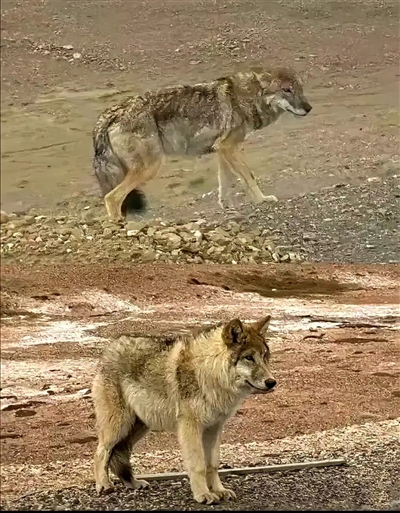On the side of the road in the Hoh Xil Nature Reserve in northwest China's Qinghai Province, you might see a chubby wolf wagging its tail, rolling on the ground, and exposing its belly in front of the passing cars in hopes of getting a meal.
However, it was skin and bones a few months ago.
It is said that the old starving wolf was kicked out of the wolf pack because of its poor hunting ability. But that all changed after a passing driver gave it two pies and posted a video of it online in July, which has ignited a surge in the wolf's popularity, with people flocking to the area to provide it with food.
Since then, the wolf has abandoned its hunting instinct and turned to passers-by for snacks that are high in oil, sugar and salt, such as pies, roasted chicken and sausages. Subsequently, more wolves have joined this behavior.

A wild wolf got fat after continued feeding from passers-by in the Hoh Xil Nature Reserve, northwest China's Qinghai Province. /CMG
A wild wolf got fat after continued feeding from passers-by in the Hoh Xil Nature Reserve, northwest China's Qinghai Province. /CMG
The wolf's change has led many netizens to find humor in its resemblance to a domestic dog, but the change means that it is losing its ability to survive in nature, which is fatal to wild animals.
"Wolves are part of the food web in the ecosystem, and as people continue to feed them, their habits will change, which will disrupt their role in the ecosystem and affect the stability of the ecosystem," said Qi Xinzhang, deputy head of the Xining Wildlife Park in the province.
Although wolves sit near the top of the food web, their kill rate is only 14 percent. They don't eat every day. Instead, they live a life of feast or famine, and hunger is their norm.
"In nature, animals are born and die. They have their own laws of survival," said Dai Qiang, a researcher at the Chengdu Institute of Biology of the Chinese Academy of Sciences. Additionally, he noted that wild animals, particularly those injured, may carry disease-causing bacteria.
In fact, it is not uncommon for wild animals like wolves and bears to be fed alongside the roads in the province. People are concerned about wild animals, but casual feeding sometimes can cause harm to animals and themselves as well.
Qi recommended that if a wild animal needs assistance or rescue, people can report to the forestry department for professional handling.
So far, some parts of the country have enacted laws and regulations prohibiting the feeding of wild animals. Shanghai municipal government implemented regulations on October 1 this year, prohibiting the feeding of wild animals. On October 16, a newly revised wildlife protection law in southwest China's Sichuan Province made it clear that feeding and driving away wild animals are prohibited while observing and photographing them.
"It is a good thing that the event has aroused attention. Only when more people have a better knowledge of wildlife can they care about wildlife in the right way," said Qi.